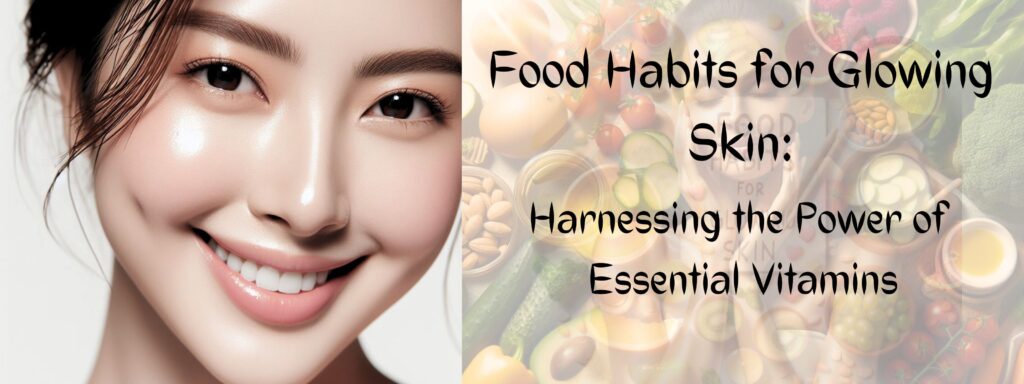Embarking on the journey to achieve radiant, youthful skin requires a foundation of proper nutrition. The key lies in four essential vitamins – A, C, D, and E – each wielding a significant influence on skin health, warding off aging effects, and fostering a timeless glow. In this exploration, we will unravel the unique significance of these vitamins and discover practical ways to integrate them into our daily diet, unlocking the secrets to optimal skin benefits. Join us on this quest for luminous skin through the power of essential nutrients.
Read More: DIY Facial Will Give 10 Times More Glow at Home than Parlor
1. Vitamin A
- Not enough Vitamin a can lead to keratosis. It shows up as small rashes on your hands, feet, and thighs.
- Food sources: Ensure ample intake of Vitamin A through carrots, pumpkins, fatty fish, eggs, tomatoes, spinach, and capsicum.
2. Vitamin C
- Vital for averting hyperpigmentation and preserving skin elasticity, Vitamin C serves as a guardian against wrinkles and freckles.
- Boost your Vitamin C intake by enjoying citrus fruits such as oranges and amla. Include capsicum and guava in your meals for a rich source of this vital nutrient. These foods provide ample amounts of Vitamin C, crucial for skin health. Adding them to your diet promotes a glowing complexion. Eating these fruits regularly supports overall skin wellness. Enjoy the benefits of radiant skin by incorporating these nutrient-rich foods. Elevate your skincare routine with a variety of Vitamin C-rich fruits and vegetables.
3. Vitamin D
- Vitamin D is essential for healthy skin and a strong immune system. It helps maintain skin health and prevents diseases by supporting the body’s natural defenses.
- Food sources: The sun is a natural provider of Vitamin D through exposure. Alternatively, for supplementation, medical stores offer convenient options.
4. Vitamin E
- Often underestimated, Vitamin E wields significant influence over skin health, contributing to a youthful complexion.
- Food sources: Moringa emerges as a potent source of Vitamin E, surpassing the levels found in carrots and oranges. Beyond supporting skin health, Moringa offers additional advantages like cholesterol control and heightened energy levels.
Additional Tips for healthy glowing skin
- Dry fruits and seeds, including pistachios, almonds, cashews, and pumpkin seeds, are excellent sources of essential vitamins.
- Moringa, found in powder form, is a superfood. It has more Vitamin A than carrots and more Vitamin C than oranges. Adding two spoonfuls to your morning and evening routine can boost energy levels.
- Taking a comprehensive approach to your diet by including these vitamin-rich foods ensures a radiant and youthful complexion, fostering skin health from within.
Wrapping up
Achieving radiant, glowing skin is as simple as nourishing your body with a balanced diet packed with essential vitamins. Adding Moringa to your routine unlocks the secret to a vibrant complexion. Prioritizing these dietary elements contributes to the holistic health of your skin, empowering you to achieve and sustain a luminous complexion that defies the effects of time.
Frequently Asked Questions (FAQs):
1. Why are vitamins essential for skin health?
Healthy skin is crucial, and vitamins play a key role in addressing skin issues. Vitamin A, for instance, helps prevent conditions like keratosis, promoting a smoother complexion. Vitamin C fights hyperpigmentation, and combating wrinkles.
2. What happens if there is a deficiency of these vitamins?
Deficiency in these vitamins can lead to various skin issues. Vitamin A deficiency may result in keratosis, causing rashes. Insufficient Vitamin C can lead to hyperpigmentation, wrinkles, and freckles. Lack of Vitamin D may impact skin health, potentially causing diseases. Vitamin E deficiency can contribute to premature aging and compromised skin health.
3. How can I incorporate these vitamins into my diet?
Include vitamin-rich foods in your diet. Carrots, pumpkins, fatty fish, eggs, citrus fruits, and green vegetables offer Vitamin A and C. Sun exposure is a natural source of Vitamin D, and supplementation is available. Moringa, found in powder form, is a potent source of Vitamin E, surpassing traditional sources like carrots and oranges.
4. How does Moringa contribute to skin health?
Moringa, rich in Vitamin E, offers substantial benefits for skin health. Beyond vitamins, it contains antioxidants and supports cholesterol control and increased energy.

.jpeg)
.jpeg)
.jpeg)
.jpeg)


